Notes: Hollinwood station was opened by the Lancashire and Yorkshire Railway (LYR) on 1st April 1881 as part of the Thorpes Bridge Junction to Oldham Werneth line. The purpose of the line was to provide a direct route from Manchester to Oldham avoiding the steep incline on the existing LYR line that provided a route to Oldham via Middleton.
The Thorpes Bridge to Oldham Werneth line had originally been proposed in 1848. It was re-surveyed ten years later in 1858, but it was not until 13th January 1875 that the LYR authorised the funding of its construction. On 30th June 1875 a contract was let to a Mr Evans, and work commenced on 2nd August 1876. Evans employed 450 men to construct the line which was completed by 1880. It created a through route to Rochdale via Oldham which became known as the Oldham Loop.
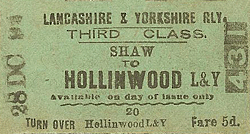 |
Hollinwood station was 4 ¾ miles from Manchester Victoria. It was located on the west side of Railway Road on an embankment. As the line was double-track the station was provided with two platforms. These were accessed from a street level single-storey brick building on Railway Road, which contained the booking office. The building was constructed of yellow |
brick, a favourite of the LYR. It had a short canopy above the entrance door. Inside the booking office was a ‘Benn and Cronin Traffic Indicator’ that occupied a complete wall. The indicator showed passengers what services were running by means of slots into which times and destinations could be fitted.
At the rear of the building a subway led to the platforms. Both platforms had to be accessed from the subway because immediately to the rear of the booking office there were two goods lines and a siding. The subway passed under these lines before reaching a set of steps to the’ up’ (Manchester) platform. It continued to the down platform, which was also reached by steps. On both platforms there were wooden buildings with canopies, which provided facilities for passengers. On the up platform there was also a small brick building at the north-eastern end which was used as a lamp room. A signal box also stood on this platform a little further to the north-east than the lamp room.
North-east of the station there was a substantial goods yard possessing two goods sheds with a 10 ton crane between them, and a loading bank with sidings running either side. A private siding running through the yard also served the Albion Spinning Company's mill to the east of the yard.
| At the time of its opening Hollinwood was served by fifteen trains towards Oldham and the same number to Manchester Victoria. On 1st January 1922 the station became part of the London & North Western Railway (LNWR) when that company took over the LYR. However on 1st January 1923 the LNWR was in turn absorbed by the London Midland and Scottish |
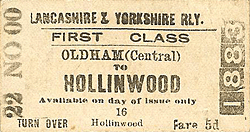 |
Railway (LMS). By 1938 Hollinwood was still being served by fifteen local trains. On Friday evenings a train to Glasgow and Edinburgh via Rochdale called at the station. On Sundays-only a train that originated at Royton and ran on to Blackpool Central via Manchester Victoria served Hollinwood, as did another that started at Milnrow and ran to Southport via Manchester Victoria.
On 1st January 1948 Hollinwood became part of the nationalised British Railways (London Midland Region). During the last year of fully steam-operated services in 1958 there were eighteen trains in each direction between Manchester and Rochdale. In June 1958 British Railways introduced Diesel Multiple Units (DMUs) on the Oldham Loop. A Cravens-built type of DMU (later known as class 104) which had twin power cars was used on the line as they were easily able to cope with the steep gradients. In both directions trains called at Hollinwood every twenty minutes. The northbound service destinations alternated between Rochdale and a Royton. In total there were twenty-nine trains running between Manchester and Rochdale and twenty-five between Manchester and Royton: this was Hollinwood’s highest-ever frequency of service.
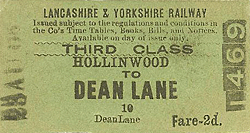 |
The Reshaping of British Railways (Beeching Report) of March 1963 recommended the closure of the Royton branch to passengers but made no reference to the Oldham Loop or any of its stations. Nevertheless, September 1964 saw a decline in services calling at Hollinwood. The service between Manchester and Rochdale became irregular, with trains calling at |
at Hollinwood about every 45 minutes in each direction. Trains between Royton and Manchester Victoria were reduced to seven on weekdays in each direction, eight on Saturdays, and there were none on Sundays.
From April 1966 further changes took place, including the closure of the Royton Branch (as recommended by Beeching) but also Oldham Central station (which Beeching implied was to be retained). The service pattern was altered so that most trains serving Hollinwood ran between Manchester Victoria and Oldham Mumps, with fewer continuing onward to Rochdale. By 1968 the Hollinwood service had settled into a thirty minute frequency in each direction. Only alternate northbound trains continued beyond Oldham Mumps to Rochdale giving only an hourly frequency to that town (although services were also provided to and from Manchester Victoria via Castleton).
 |
During the 1970s Hollinwood lost its buildings and simple ‘bus shelters’ were provided; the station also became an unstaffed.
It escaped the attention of the Beeching Report. However the British Railways Network for Development map of March 1967, published when Stanley Raymond was Chairman of the British Railways Board and Barbara Castle the Secretary of State for Transport, showed that Oldham Mumps to Rochdale would not form part of the ‘basic railway network’. Subsequently a footnote in the May 1972 passenger timetable advised that the Secretary of State had given consent to the withdrawal of passenger services between Oldham Mumps and Rochdale. However, by this date, the South East Lancashire North East Cheshire (SELNEC) Passenger Transport Executive (Greater Manchester Passenger Transport Executive – GMPTE - from April 1974) had stepped in and agreed to fund the continuation of the service.
| From the introduction of the May 1979 timetable trains that ran only as far as Oldham Mumps were extended to run further north to Shaw & Crompton. The thirty-minute interval service at Hollinwood was retained. In the May 1989 timetable a half-hourly service to Rochdale was introduced, with extra services at peak hours running to Shaw & Crompton. |
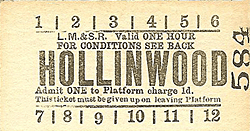 |
From May 1995 Hollinwood was served by half-hourly Manchester Victoria - Shaw & Crompton trains in each direction; Rochdale trains continued to run at a half-hour frequency, but they passed through Hollinwood without stopping. This was the last alteration to Hollinwood’s train services.
Hollinwood signal box closed in the 1990s, and the station was altered late in that decade to facilitate the construction of the M60 Motorway. It was cut back at the Oldham end, and lengthened slightly in the Manchester direction.
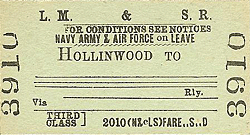 |
In the mid-1990s the GMPTE had been looking at extending its 1992-opened Metrolink tram system. One idea that had been considered as early as 1984 was to use the Oldham Loop as a means of extending tram services to Oldham and Rochdale. By the beginning of the 21st century plans had been drawn up, and a few years later funding was in place to carry |
out the required works. To enable these works to go ahead the Oldham Loop had to close. Hollinwood, along with all other stations on the line, closed on Saturday 3rd October 2009. A number of special services, including steam-hauled trains, ran on the last day to celebrate the line and its history. Many local people turned out to watch the last trains run. The final train to depart from Hollinwood was the 23:25 Manchester Victoria to Rochdale service. Demolition of the station began almost immediately, and by May 2010 there was nothing left of it.
On 13 June 2012 a Metrolink tram stop called Hollinwood opened on the station site.
Tickets from Michael Stewart, Route map drawn by Alan Young Other web sites: Lost lines, a selection of pictures of the Oldham Loop line taken on 30th September 2009, shortly before closure. Class 25s and Much More web site has a feature called Farewell to the Oldham Loop with 51 pictures taken in August 2009. Sam Dixon's UK National Rail, Heritage Rail & Former Rail web site with 124 pictures of the Oldham loop line take two days before closure. Tom Fenton's web site also has a feature Farewell to the Oldham Loop with 27 pictures taken in August 2009.
Sources: The Oldham Loop – Part One – Manchester Victoria to Shaw & Crompton, Jeffery Wells, Foxline Publishing ISBN 1870119681 and The Lancashire & Yorkshire Railway Volume 2, John Marshall, David & Charles. ISBN 0715349066. Additional source Alan Young
To see other stations on the Oldham Loop Line click on the station name:
Dean Lane, Failsworth, Oldham Werneth, Oldham Central, Oldham Mumps, Derker, Royton Junction, Shaw & Crompton, New Hey & Milnrow.
See also Royton |

old5.jpg)


old6.jpg)
old7.jpg)
old1.jpg)
old6.jpg)
4.jpg)
11.jpg)
16.jpg)
.jpg)

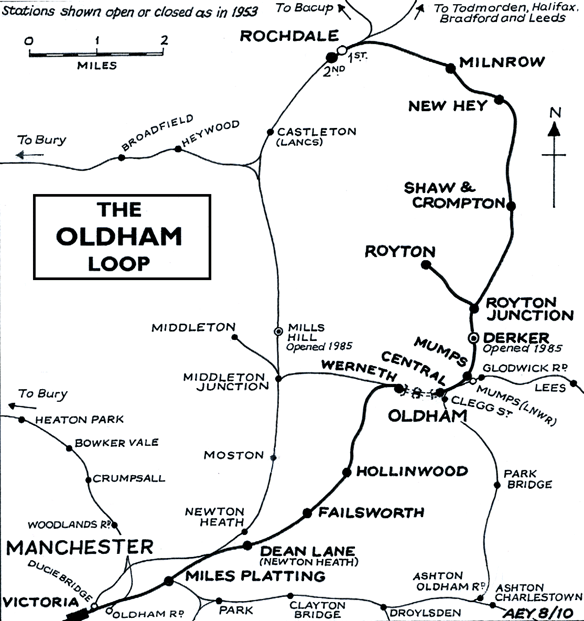





old_thumb9.jpg)
old_thumb2.jpg)
old_thumb4.jpg)
old_thumb3.jpg)
thumb1.jpg)
thumb2.jpg)
thumb3.jpg)
thumb5.jpg)
thumb6.jpg)
thumb7.jpg)
thumb8.jpg)
thumb9.jpg)
thumb10.jpg)
thumb12.jpg)
thumb13.jpg)
thumb14.jpg)
thumb15.jpg)
thumb17.jpg)
.jpg)

 Home Page
Home Page